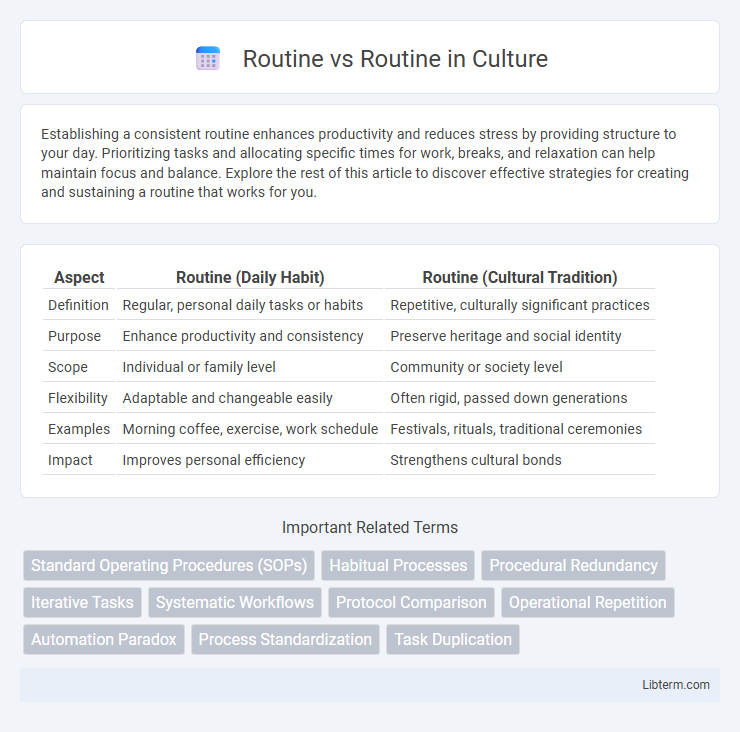Establishing a consistent routine enhances productivity and reduces stress by providing structure to your day. Prioritizing tasks and allocating specific times for work, breaks, and relaxation can help maintain focus and balance. Explore the rest of this article to discover effective strategies for creating and sustaining a routine that works for you.
Table of Comparison
| Aspect | Routine (Daily Habit) | Routine (Cultural Tradition) |
|---|---|---|
| Definition | Regular, personal daily tasks or habits | Repetitive, culturally significant practices |
| Purpose | Enhance productivity and consistency | Preserve heritage and social identity |
| Scope | Individual or family level | Community or society level |
| Flexibility | Adaptable and changeable easily | Often rigid, passed down generations |
| Examples | Morning coffee, exercise, work schedule | Festivals, rituals, traditional ceremonies |
| Impact | Improves personal efficiency | Strengthens cultural bonds |
Understanding the Concept of Routine
Routine involves a sequence of habitual actions performed regularly to increase efficiency and predictability in daily life. Establishing a routine helps streamline tasks, reduce decision fatigue, and enhance productivity by creating structured patterns of behavior. The concept of routine centers on consistency and repetition, enabling individuals to build positive habits and maintain organization.
Types of Routines: Personal vs Professional
Personal routines include daily habits such as morning exercises, meal planning, and self-care activities that enhance individual well-being and productivity. Professional routines consist of structured workflows like project management, team meetings, and deadline tracking, designed to optimize work efficiency and organizational goals. Balancing personal and professional routines helps maintain overall life harmony and boosts long-term success.
The Psychology Behind Daily Routines
Daily routines significantly influence mental health by establishing predictable patterns that reduce anxiety and increase productivity. The psychology behind routines emphasizes habit formation, where consistent behaviors trigger neural pathways promoting efficiency and emotional stability. Research shows that stable routines enhance cognitive function and resilience by minimizing decision fatigue and fostering a sense of control.
Benefits of Establishing a Consistent Routine
Establishing a consistent routine enhances productivity by creating structured time blocks that reduce decision fatigue and improve focus. It promotes mental well-being through regular sleep patterns and balanced daily habits, fostering stability and reducing stress. Consistent routines also support goal achievement by building momentum and reinforcing positive behaviors through repetition.
Routine vs Habit: Key Differences
Routine consists of a sequence of planned actions performed regularly to achieve specific goals, while a habit is an automatic behavior triggered by contextual cues without conscious intention. Routines require deliberate effort and planning, whereas habits develop through repetition and become ingrained neural pathways in the brain. Understanding the distinction aids in effectively establishing productive routines and modifying undesirable habits for behavior change.
How Competing Routines Affect Productivity
Competing routines create cognitive friction that diminishes overall productivity by forcing frequent task-switching and reducing focus. Employees managing overlapping habits often experience fragmented attention, leading to increased errors and longer completion times. Optimizing workflows with well-defined, non-conflicting routines enhances efficiency by promoting sustained concentration and consistent task execution.
Tips for Balancing Multiple Routines
Balancing multiple routines effectively requires prioritizing tasks based on urgency and importance while maintaining flexibility to adjust as needed. Utilizing time-blocking techniques and setting clear, achievable goals can enhance productivity across different daily activities. Regularly reviewing and refining each routine ensures sustainable progress and prevents burnout.
When Routine Becomes Monotony
Routine provides structure and efficiency in daily life by automating repetitive tasks, which boosts productivity and reduces decision fatigue. However, when routine lacks variation or personal meaning, it transforms into monotony, causing decreased motivation and increased stress levels. Introducing novel activities or setting new goals can prevent monotony by re-engaging the brain's reward system and maintaining mental well-being.
Evolving Your Routine for Better Results
Evolving your routine involves regularly assessing and refining your daily habits to maximize productivity and well-being. Incorporating new strategies, such as time-blocking or mindfulness practices, can lead to improved focus and reduced stress. Consistent adjustments based on performance metrics ensure your routine remains aligned with your goals and adapts to changing circumstances.
Creating a Flexible Routine for Sustainable Success
Creating a flexible routine enhances productivity by allowing adaptability to changing priorities while maintaining consistent progress towards goals. Incorporating adjustable time blocks for critical tasks ensures balance between structure and spontaneity, promoting long-term sustainability. Emphasizing regular review and modification aligns routines with evolving demands, supporting continuous improvement and success.
Routine Infographic

 libterm.com
libterm.com